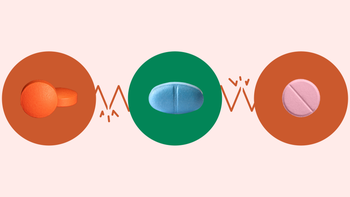
Is It Dangerous to Mix Ibuprofen and Alcohol?
Key takeaways:
Combining ibuprofen (Advil, Motrin) and alcohol can be harmful, especially for older adults and those with certain health conditions. The risk of complications is higher for people who take ibuprofen regularly and people who drink heavily.
Combining ibuprofen and alcohol can raise your risk for serious side effects, such as gastrointestinal (GI) bleeding and kidney or liver problems.
It’s best to wait at least 10 hours after taking a dose of ibuprofen to drink alcohol. But don’t stop your ibuprofen just to drink if you’re taking it regularly for a chronic health condition.

Ibuprofen (Advil, Motrin) is one of the most popular nonsteroidal anti-inflammatory drugs (NSAIDs). NSAIDs are a group of medications that are commonly taken to treat pain and inflammation.
Ibuprofen comes in many different forms and is available with a prescription and over the counter (OTC). Since the medication is so widely available, people sometimes wonder if it’s OK to drink alcohol if you’re taking ibuprofen. The short answer is no, it’s not recommended.
Let’s dive into why it’s not a good idea.
SHINGRIX (Zoster Vaccine Recombinant, Adjuvanted) is now $0 for almost everyone*
Get SHINGRIX at the pharmacy or in-network doctor’s office today. 98% of privately insured people pay $0 and all Medicare Part D beneficiaries pay $0 at the pharmacy.
Prescribing Information
*Coverage and cost may vary and are subject to change without notice. Reimbursement decisions are made by individual insurance plans.


SHINGRIX is an FDA-approved vaccine for the prevention of shingles (herpes zoster) in adults 50 years and older. SHINGRIX is not used to prevent chickenpox.
• You should not receive SHINGRIX if you are allergic to any of its ingredients or had an allergic reaction to a previous dose of SHINGRIX
• An increased risk of Guillain-Barré syndrome (severe muscle weakness) was observed after vaccination with SHINGRIX
• Fainting can happen after getting injectable vaccines, including SHINGRIX. Precautions should be taken to avoid falling and injury due to fainting
• The most common side effects are pain, redness, and swelling at the injection site, muscle pain, tiredness, headache, shivering, fever, and upset stomach
• SHINGRIX was not studied in pregnant or nursing women. Tell your healthcare provider if you are pregnant, plan to become pregnant, or are breastfeeding
• Vaccination with SHINGRIX may not protect all individuals
• Ask your healthcare provider about the risks and benefits of SHINGRIX. Only a healthcare provider can decide if SHINGRIX is right for you
You are encouraged to report vaccine adverse events to the US Department of Health and Human Services. Visit www.vaers.hhs.gov to file a report, or call 1-800-822-7967.
For US audiences.
Trademarks are property of their respective owners.
©️2024 GSK or licensor.
PMUS-SGXWCNT240015 May 2024
Produced in the USA.
GoodRx Health information and resources are reviewed by our editorial staff with medical and healthcare policy and pricing experience. See our editorial policy for more detail. We also provide access to services offered by GoodRx and our partners when we think these services might be useful to our visitors. We may receive compensation when a user decides to leverage these services, but making them available does not influence the medical content our editorial staff provides.
Can I take ibuprofen while drinking alcohol?
Generally speaking, it’s best to avoid combining ibuprofen and alcohol. But the full answer to this question depends on a few different factors.
For most people, having a small amount of alcohol (a single drink) with ibuprofen isn't likely to be harmful. This is also the case for people who take the occasional dose of ibuprofen during a hangover.
But moderate or heavy alcohol use could raise the risk of side effects from ibuprofen. And certain complications are more likely to happen when you’re taking ibuprofen long term compared to occasional doses for mild pain. People with certain health conditions, such as kidney disease, may be at an even higher risk for certain problems when combining ibuprofen and alcohol.
What are the risks of taking ibuprofen while drinking?
There are a few risks to consider when drinking alcohol while taking ibuprofen. It’s important to be able to recognize the signs of these side effects, and when to seek medical attention.
Stomach irritation or gastrointestinal bleeding
Combining ibuprofen and alcohol can raise the risk of gastrointestinal (GI) bleeding and stomach ulcers. GI bleeding is bleeding that happens in your digestive tract. A stomach ulcer (peptic ulcer) is a sore in the lining of your stomach or the beginning of your small intestine.
All NSAIDs, including ibuprofen, can cause these GI complications. On its own, alcohol also carries a risk of GI bleeding and ulcers, especially when consumed in large amounts. Combining alcohol with ibuprofen or other NSAIDs raises your risk more than either does alone.
Read more like this
Explore these related articles, suggested for readers like you.
Some people may have greater GI risks when it comes to ibuprofen and alcohol. Overall, men are more likely to experience GI bleeding for any reason than women. And older adults are four times more likely to experience GI bleeding if they’re taking NSAIDs. They also have a higher risk of developing ulcers compared to younger adults.
Symptoms of GI bleeding can include:
Red, black, or tarry stools
Blood in the toilet
Sudden nausea or loss of appetite
Stomach pain
Vomiting bright red blood or vomit that resembles coffee grounds
Get medical help right away if you notice symptoms of GI bleeding.
Kidney damage
Ibuprofen has the potential to cause kidney damage. The risk is higher for those with chronic kidney disease. Alcohol can also cause kidney damage. Since both ibuprofen and alcohol can affect your kidneys, your risk of problems may go up when the two are mixed.
Symptoms of kidney damage may include:
Decreases or changes in urination
Fatigue
Leg or ankle swelling
Nausea
Shortness of breath
Contact your healthcare provider if you experience any of the above symptoms. Discuss the use of ibuprofen or alcohol with your provider beforehand if you have existing kidney problems.
Liver damage
It’s well known that alcohol can cause liver damage, especially heavy or chronic consumption. In most cases, taking ibuprofen on its own isn’t hard on the liver. But laboratory studies suggest that when combined, ibuprofen may raise the risk of liver damage that alcohol may cause.
Some symptoms of liver damage include:
Yellowing of the skin
Upper-right abdominal (stomach) pain
Abdominal swelling
Nausea and vomiting
Seek medical care if you think you’re having symptoms of liver damage. And discuss the use of ibuprofen or alcohol with your healthcare provider if you already have liver problems. It’s typically recommended to avoid combining ibuprofen and alcohol if you have risk factors for liver disease.
Heart problems
Ibuprofen can raise the risk of heart problems, such as heart attacks. This is especially true if you’re taking higher doses (2,400 mg or more per day). Heavy or regular alcohol consumption can also cause heart-related problems.
Heart-related problems linked to alcohol include:
High blood pressure
Heart attacks
Stroke
Heart failure
Coronary artery disease
Over time, combining ibuprofen and alcohol may raise the risk of heart problems more than either would alone. If you have existing heart problems, discuss the use of NSAIDs or alcohol with your healthcare provider. In some cases, they may recommend avoiding one or both.
What are other side effects of ibuprofen?
Ibuprofen is usually well-tolerated when taken as directed. But it can cause other side effects than those discussed above.
Common side effects of ibuprofen include:
Nausea
Heartburn
Stomach pain
Dizziness
It’s recommended to only take OTC ibuprofen for 3 days for a fever, or 10 days for pain, unless told otherwise by your healthcare provider. Limiting this medication to only a few days helps make side effects less likely to happen.
How long after taking ibuprofen can I drink alcohol?
In short, you should wait at least 10 hours after your last dose of ibuprofen before drinking alcohol. That’s about how long it takes the average person’s body to clear ibuprofen after a dose. But if you have liver problems, it might take about 17 hours.
If you’ve been taking ibuprofen for a while, speak with your healthcare provider about how long you should wait to drink alcohol. As discussed above, long-term ibuprofen use can raise your risk of serious side effects like GI bleeding. Your risk of these complications may take some time to return to normal after stopping ibuprofen. Drinking alcohol can still raise your risk of these side effects during this time.
Note: If you take ibuprofen regularly for a health condition, don’t stop the medication just to drink alcohol. This could worsen your symptoms.
What about other NSAIDs?
It’s not recommended to drink alcohol while taking any NSAID. Other popular NSAIDs include:
Meloxicam (Mobic)
Naproxen (Aleve, Naprosyn)
Celecoxib (Celebrex)
Diclofenac (Cambia, Cataflam)
Some of these are available OTC, while others require a prescription to purchase. They all carry the same warnings for serious side effects as ibuprofen. This includes avoiding alcohol when possible.
Are there any pain medications not affected by alcohol?
No, there are no pain medications that aren’t affected by alcohol. They each carry their own risks.
Acetaminophen (Tylenol) is often compared to ibuprofen. But it works differently. Acetaminophen is broken down in your body by the same natural substance that breaks down alcohol. Consistently drinking higher than recommended amounts of alcohol can damage this process. This can cause acetaminophen to turn into a toxic substance that causes liver damage.
Alcohol also interacts with other pain medications, like opioids. Opioids slow down activity in the brain. Side effects include confusion, drowsiness, and slowed breathing. Combining opioids with alcohol can lead to dangerous complications. In severe cases, the mixture can cause an opioid overdose, which can be fatal.
When should I seek medical attention?
Seek medical attention if you believe you’re having symptoms of a severe side effect. Side effects like GI bleeding and kidney or liver damage can be fatal if left untreated.
You should also call 911 or seek immediate help if you or a loved one is experiencing symptoms of alcohol poisoning:
Severe confusion
Seizures
Trouble staying awake or conscious
Slow or irregular breathing
Slow heart rate
A bluish or pale skin color
The bottom line
Most people can drink a small amount of alcohol if they’ve taken ibuprofen. But if you heavily drink, you may have a higher risk of side effects. Serious side effects of mixing ibuprofen and alcohol include GI bleeding, kidney or liver problems, and heart problems. Older adults and those with certain health conditions may have an even higher risk of these. Discuss your unique risks with your healthcare provider before combining alcohol and ibuprofen.
If you or someone you know struggles with substance use, help is available. Call the Substance Abuse and Mental Health Services Administration (SAMHSA) National Helpline at 1-800-662-4357 to learn about resources in your area.
Why trust our experts?



References
Edenberg, H. J. (2007). The genetics of alcohol metabolism: Role of alcohol dehydrogenase and aldehyde dehydrogenase variants. Alcohol Research & Health: The Journal of the National Institute on Alcohol Abuse and Alcoholism.
Kim, M., et al. (2021). Ibuprofen increases the hepatotoxicity of ethanol through potentiating oxidative stress. Biomolecules & Therapeutics.
Kim, S. H., et al. (2016). Prevalence of upper gastrointestinal bleeding risk factors among the general population and osteoarthritis patients. World Journal of Gastroenterology.
National Center for Biotechnology Information. (2023). PubChem compound summary for CID 3672, ibuprofen.
National Institute on Alcohol Abuse and Alcoholism. (2014). Harmful interactions.
National Institute on Drug Abuse. (2021). Prescription opioids DrugFacts.
National Kidney Foundation. (n.d.). Acute kidney injury (AKI).
National Kidney Foundation. (2014). Drinking alcohol affects your kidneys.
Piano, M. R. (2017). Alcohol’s effects on the cardiovascular system. Alcohol Research: Current Reviews.
Redpharm Drug, Inc. (2023). Ibuprofen [package insert].
Shimpi, T. R., et al. (2019). Imaging of gastrointestinal and abdominal emergencies in binge drinking. Canadian Association of Radiologists Journal.
Wongrakpanich, S., et al. (2018). A comprehensive review of non-steroidal anti-inflammatory drug use in the elderly. Aging and Disease.





























